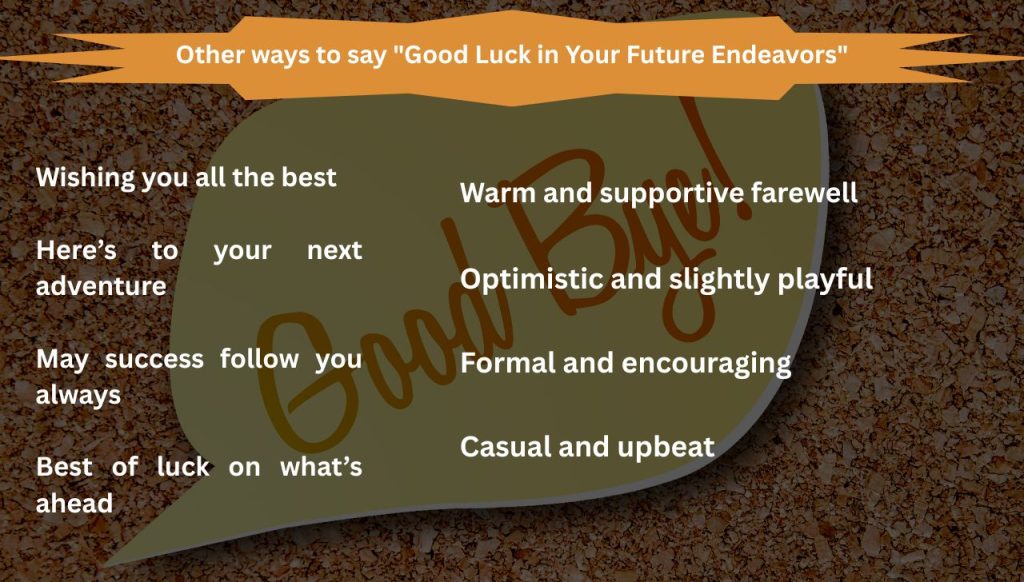Saying goodbye can be tough—especially when you want to wish someone well without sounding like a broken record. The classic “Good luck in your future endeavors” does the job, but it can feel stiff or overused. Whether parting ways with a coworker, sending off a friend, or wrapping up a professional relationship, having a few alternative phrases can make your farewell feel warmer, more personal, and more memorable. Let’s explore friendlier, more heartfelt ways to express the same sentiment—without sounding like you’re reading off a corporate script.
“Good Luck in Your Future Endeavors” Meaning
“Good luck in your future endeavors” — it sounds polite, maybe even a little formal, right? But let’s unpack what it actually means, because depending on context, it can feel sincere… or slightly cold.
The Literal Meaning
At face value, it’s a way of wishing someone well as they move on to something new.
- “Future endeavors” just means whatever they’re planning to do next — a new job, school, personal goals, or even just taking time off.
- And “good luck” is, of course, a universal phrase for positive wishes.
So, the phrase translates to something like:
“I hope everything goes well for you in whatever you do next.”
When to use “Good Luck in Your Future Endeavors”
“Good luck in your future endeavors” is one of those classic, polite phrases that people pull out when someone’s moving on — whether that’s from a job, a school, a relationship, or even a project. But context matters. Let’s break down when it fits and when it might come off… a little cold or even sarcastic.
1. Professional Departures (especially formal ones):
If a coworker or employee is leaving the company — maybe for a new role, retirement, or downsizing — this phrase keeps things neutral, respectful, and clean. Think farewell emails, HR letters, or LinkedIn posts.
“It’s been great working with you. Good luck in your future endeavors!”
2. Academic Settings:
Graduations, transfers, or someone wrapping up a research project? It’s an easy way to wish them well without getting too emotional.
3. Polite Closure (when there’s no drama):
If you’re ending a collaboration or parting ways with a client, and things are still cordial, this phrase lets you sign off with class.
Why to say “Good Luck in Your Future Endeavors”
Saying “Good luck in your future endeavors” is a polite, professional way to wish someone well as they move on to a new chapter—whether that’s a new job, a different city, or just something unknown. It’s respectful, neutral, and works in just about any situation, especially when you don’t know all the details of what’s next. This phrase keeps things classy without diving into personal territory, making it a go-to for workplace farewells, emails, or formal announcements.
It also carries a subtle sense of closure. Whether the parting is friendly or complicated, the phrase acknowledges the shift without adding drama. It’s like a courteous nod toward the future, leaving space for professionalism without forcing sentiment. If you’re unsure what to say when someone’s moving on, this simple phrase delivers encouragement while keeping things smooth and respectful.

Other ways to say “Good Luck in Your Future Endeavors”
Sure! Here’s a table with 30 alternative ways to say “Good luck in your future endeavors”, along with their meanings or emotional tone to help you choose the best fit for your context:
| Alternative Phrase | Meaning / Tone |
|---|---|
| Wishing you all the best | Warm and supportive farewell |
| Here’s to your next adventure | Optimistic and slightly playful |
| May success follow you always | Formal and encouraging |
| Best of luck on what’s ahead | Casual and upbeat |
| Cheers to new beginnings | Lighthearted and celebratory |
| Hoping great things are in store for you | Warm and hopeful |
| Onward and upward | Motivational and slightly bold |
| Go smash it! | Energetic and informal encouragement |
| Break a leg (non-literal) | Traditional theatrical good luck (informal, context-sensitive) |
| May the road rise to meet you | Poetic and old-fashioned; Irish blessing vibe |
| All the best in your journey ahead | Supportive and thoughtful |
| Knock ‘em dead | Slangy, confident send-off (use with care) |
| May your path be smooth | Calm and kind; ideal for personal notes |
| You’re going to do amazing things | Personal, inspiring tone |
| Sending good vibes your way | Casual, warm, and slightly modern |
| Keep soaring | Encouraging someone with promise or momentum |
| Here’s to chasing your dreams | Aspirational and idealistic |
| Rooting for you | Casual and sincere encouragement |
| May fortune favor you | Slightly poetic/formal |
| You’ve got this | Supportive and confidence-boosting |
| Stay awesome, wherever you go | Playful and warm |
| Excited to see what you do next | Forward-looking and personal |
| Keep doing great things | Encouraging and positive |
| May success be yours | Simple and sincere |
| Sending you strength and luck | Comforting and empathetic |
| You’ll be missed—go make us proud | Sentimental and prideful |
| Chase the horizon | Poetic, metaphorical encouragement |
| Whatever’s next, you’ve got it | Casual and confident |
| Take care and keep in touch | Warm and inviting farewell |
| Looking forward to seeing where life takes you | Supportive and open-ended farewell |
Conclusion
Wishing someone well doesn’t have to sound robotic or rehearsed. A thoughtful phrase—tailored to the relationship and moment—can leave a lasting impression. From casual to formal, humorous to sincere, how you say goodbye matters. So next time someone moves on, skip the default line. Choose words that truly resonate. After all, a meaningful farewell sticks with people long after the moment.

Grammar Nerd, ESL Trainer, Low-Key Comma Crusader
Daniel has taught English for over a decade, from small community classes in Oaxaca to bustling university halls in London. He has a knack for turning even the driest grammar points into relatable, real-life language tools—think fewer red pens, more real talk. He co-founded Grammation to make grammar less gatekeeper-y and more global. When he’s not decoding sentence structures, he’s probably hiking with a paperback novel or adding unnecessary hyphens for fun.
“The rules of grammar should empower people—not trip them up.”


